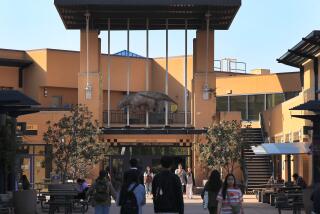With virtual campus tours, applicants explore colleges
- Share via
Kendra Kirchgessner, a high school junior, has been touring prospective college campuses in Southern California — without leaving her Sellersburg, Ind., home.
Using a personal computer, Kendra recently explored Orange Coast College in Costa Mesa, “strolling” past Watson Hall and getting a 360-degree view of the Student Center.
“I liked what the tour guides were saying about the teachers and how they helped students,” said Kendra, 17, who wants to study elementary education. “The layout was really nice, and I liked how everything was close by. The buildings are all pretty much within walking distance from one another.”
Every summer, thousands of families start the college search in earnest with a road trip. But more and more schools are bringing the experience of visiting a campus online. With students applying to more schools and colleges competing for lucrative out-of-state students, universities are upping the virtual ante.
Schools have long made their own online campus maps and slick videos, but the demand for sophisticated online experiences has given rise to companies that partner with schools to create virtual tours.
YouVisit Inc. uses 360-degree images to guide visitors from place to place at universities such as Yale, Columbia and UC Riverside. A virtual student gives information on the lecture halls, gyms and dormitories, as well as the surrounding area. It’s like a souped-up Google Street View with an undergraduate narrator.
“Students now are applying to more colleges, there’s more competition for admission and they want to compare financial aid packages,” said Audrey Kahane, a college admissions counselor in the Los Angeles area. “But when you’re applying to so many schools, it’s just not practical to go out and visit every one, especially when they’re all across the country.”
“Virtual tours can give them a sense of the school,” Kahane said.
Schools pay a minimum of $3,000 a year for the YouVisit service, and the client base has been doubling every year and growing even faster in recent months, said Abi Mandelbaum, who launched YouVisit in 2008. The Aventura, Fla., company has worked with 150 universities and its tours have hosted about 2 million visitors so far.
Mandelbaum said some schools that adopted his company’s service saw a 30% increase in physical visits the next year.
Orange Coast College adopted the virtual tour as a supplement to its in-person tour service. When budget cuts hit, the school couldn’t afford as many student workers, so it started using the virtual tour as the main way for prospective students to check out the campus.
“We started to say, ‘Well, jeez, this seems more effective anyway,’” said Jeff Hobbs, a spokesman for Orange Coast College. “We’re getting inquiries from people from New York, Arizona and New Mexico. And now we’re doing thousands of tours a month instead of just a few.”
With the vast majority of students physically visiting four or fewer schools in their search, according to Mandelbaum’s estimates, schools need online tours to stand out and attract more visitors and applicants, Mandelbaum said. That means giving more than just a description of amenities.
“It is important for them to put themselves in prospective students’ shoes, and offer this stuff in detail so they can feel more confident in applying to their university,” he said.
Financially strapped schools are also trying to capitalize on the growing number of international and out-of-state applicants, who often pay higher tuition. “Partner schools are receiving higher numbers of out-of-state applications from people who weren’t actually able to visit,” Mandelbaum said.
College counselors and families said virtual tours are no replacement for the real thing. Virtual tours don’t let prospective students sit in on actual classes or approach current students to ask questions. But experts said the tours can be a good first step in narrowing down choices.
Katherine Cohen, chief executive of IvyWise and Applywise.com, which advise mostly applicants to Ivy League schools, says she’s seen international students and others enroll in universities they’ve never set foot upon.
Cohen said her company found about a year and a half ago that families were spending $3,500 on applying for college, between the costs of traveling to visit schools, application fees and SAT prep classes. Those costs have recently increased, she said.
“It might be wise to do the virtual tour, do the due diligence and decide where to apply,” she said. “I think it’s a smart way to start. We don’t want parents wasting their money and the students wasting their time.”
Another virtual visit company, CampusTours Inc., makes detailed electronic maps and videos so prospective students and parents can check out campuses from their Web browsers and smartphones. The Maine company has built tours for Pepperdine University, the University of Miami, Sweet Briar College and others.
Some of the multi-layered maps include details for those who want to know about places to hike or see historical features. For Sweet Briar College, this includes a map of the places on campus where ghost sightings have been reported.
CampusTours President Chris Carson said this is an improvement on the usual online school marketing materials. “There are still schools out there that treat the tour as a laundry list of their facilities, Carson said. “But recently, schools are saying these are not giving a good impression of what the school is about.”
CampusTours’ videos, which include interviews with current students, have become much more useful to applicants looking for individualized perspectives on things like sports, clubs and Greek life, Carson said. Universities use these materials to set themselves apart, he said. “Instead of being all things to all people, here’s a way to deal with things that appeal to different populations. It allows people to self-select.”
However, IvyWise’s Cohen said, virtual tours are not a replacement for the real thing. “It’s good for families because tours today are no longer just slide shows of images,” Cohen said. “But I believe nothing beats the sense of stepping on the college campus.”
RELATED:
Too busy? How to get time back on your side
DemiDec Dan is a legend in Academic Decathlon’s rarefied world
More to Read
Inside the business of entertainment
The Wide Shot brings you news, analysis and insights on everything from streaming wars to production — and what it all means for the future.
You may occasionally receive promotional content from the Los Angeles Times.











